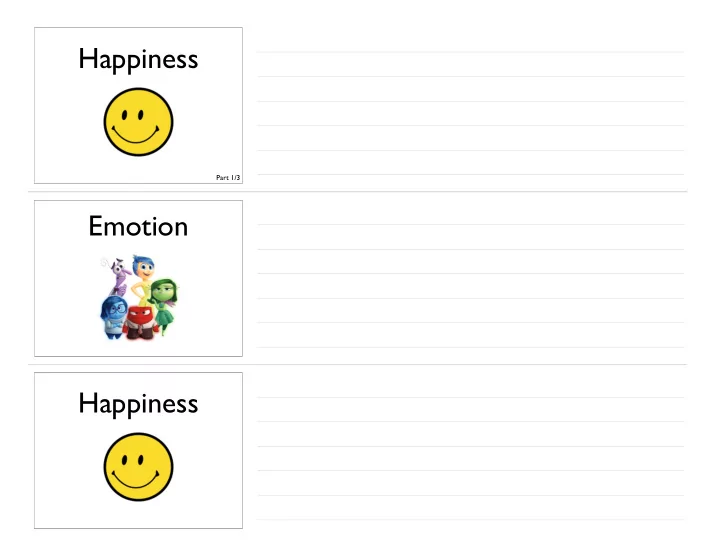

Happiness Part 1/3 Emotion Happiness
Questions + Themes What do we want ? What do we need ? Does getting what we want make us happy? What does make us happy? What do we want?
Abraham Maslow (1908-1970) “Maslow’s Hierarchy of Needs”
“After so many days on the road, you know you have a job and a family, but that's more like something you read about once in a Lazarus Lake book. The real is what's in front of you, and you break down your life into 'What am I going to drink?' 'Where will I find something to eat?' 'Where will I take a shit?' 'Where am I going to sleep?' And that's really all that matters.”
Testing the Hierarchy Testing the Hierarchy 77,646 people 51 of the world’s poorest countries “Consumption Adequacy” Autonomy Life Satisfaction (Martin & Hill, 2012) 2.4 Low Autonomy Life Satisfaction High Autonomy 1.6 0.8 0 Adequate Inadequate Basic Needs Met? (Martin & Hill, 2012)
Happiness Up next: Part 2/3 Happiness Part 2/3
Do we want what we need? Does what we want make us happy?
Affective Forecasting Affective Forecasting let’s predict: how happy will ____ make us? Affective Forecasting vs.
made up 5 data!! Future Happiness 4 3 2 1 0 Lottery Paralysis real 5 data Future Happiness 4 3 2 1 0 Lottery Paralysis (Brickman et al., 1978)
Blog Posts of Terminally Ill Patients Non-Patient Forecast Sometimes the flood of emotions becomes almost unbearable. Sitting here thinking about how ALS is robbing me of my voice, my breath, my stride and my dignity, it is tempting to retreat inside and isolate myself from family and friends who love me. Why burden them with what I am becoming? Why make a difficult future for me even worse for them? (Goranson et al., 2017) Blog Posts of Terminally Ill Patients Real Blogpost Surrounded here by so much love and care I feel I am ready for the next step. I have no regrets at all – I have had a full life, touched and been touched by such wonderful family and friends. So if there is to be a final lesson for me it is that love is the ultimate gift — love and honesty. I am so grateful for the messages of support I have received from readers of this blog. (Goranson et al., 2017)
Blog Posts of Terminally Ill Patients 3 Patients’ Posts Non-Patients’ Forecasts 2 1 Positive Sentiment Negative Sentiment (Goranson et al., 2017) Last Words of Death Row Inmates 3 Inmates’ Last Words Non-Inmates’ Forecasts 2 1 Positive Sentiment Negative Sentiment (Goranson et al., 2017) “Impact Bias” The tendency to overestimate the difference of alternatives
Does money buy happiness? Does money buy happiness? 8 Happiness Rating 7 You? 6 (2 JHU grads, on average) 5 $10,000 $100,000 $1,000,000 Household Income (Aknin et al., 2009) Does money buy happiness? 8 Happiness Rating 7 You? 6 (2 JHU grads, on average) 5 $10,000 $100,000 $1,000,000 Household Income (Aknin et al., 2009)
Does money buy happiness? 8 Happiness Rating 7 You? 6 (2 JHU grads, on average) 5 $10,000 $100,000 $1,000,000 Household Income (Aknin et al., 2009) “Money doesn’t make you happy. I now have $50 million, but I was just as happy when I had $48 million.” Does money buy happiness? 8 Happiness Rating 6.5 5 Actual Predicted 3.5 2 $10,000 $100,000 $1,000,000 Household Income (Aknin et al., 2009)
Happiness Up next: Part 3/3 Happiness Part 3/3
Does money buy happiness? 8 Happiness Rating 6.5 5 Actual Predicted 3.5 2 $10,000 $100,000 $1,000,000 Household Income (Aknin et al., 2009) How to buy happiness X Save up to buy yourself something big
How to buy happiness - Prefer experiences to things - Spend on others - Many small joys > a few big ones - Avoid comparison shopping How to buy happiness - Prefer experiences to things - Spend on others - Many small joys > a few big ones - Avoid comparison shopping Things vs. Experiences
6.3 Satisfaction 6.2 6.1 Experiential 6 Material 5.9 5.8 5.7 5.6 Initial Current Time Point Maximizing material things vs. experiences Satisficing “Positional Concerns”
“Positional Concerns” A: Your yearly income is $50,000; others earn $25,000 B: Your yearly income is $100,000; others earn $200,000 (Prices are what they are currently, and prices [therefore the purchasing power of money] are the same in states A and B.) “Positional Concerns” A: Your yearly income is $50,000; others earn $25,000 B: Your yearly income is $100,000; others earn $200,000 (Prices are what they are currently, and prices [therefore the purchasing power of money] are the same in states A and B.) A: You have 2 weeks of vacation; others have 1 week B: You have 4 weeks of vacation; others have 8 weeks “Positional Concerns” A: Your yearly income is $50,000; others earn $25,000 B: Your yearly income is $100,000; others earn $200,000 (Prices are what they are currently, and prices [therefore the purchasing power of money] are the same in states A and B.) A: You have 2 weeks of vacation; others have 1 week B: You have 4 weeks of vacation; others have 8 weeks (Solnick & Hemenway, 1997)
Does money buy happiness? 8 Happiness Rating 7 6 5 $10,000 $100,000 $1,000,000 Household Income (Aknin et al., 2009) Which Experiences?
Which Experiences? Experience Sampling 2,250 people with an iPhone App “What are you doing right now?” “How are you feeling right now?” (0-100) Which Experiences? 100 Happiness (0-100) 90 80 70 60 50 Working TV Talking Exercise Sex Rest (Killingsworth & Gilbert, 2010)
Which Experiences? Which Experiences? X Happiness is something you do
Happiness
Recommend
More recommend